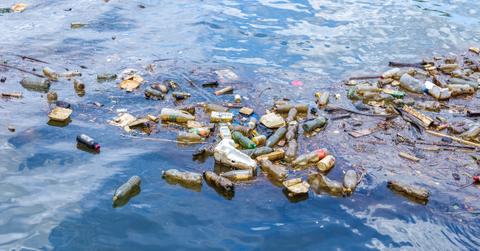7 Caribbean Countries Are Banning Single-Use Plastic Starting Jan. 1
A single-use plastic ban is going into effect in these Caribbean nations.
Updated Jan. 3 2020, 3:17 p.m. ET

Slowly but surely, more and more cities, states, and countries are enacting bans on single-use plastic and polystyrene (aka Styrofoam) all around the world. And beginning Jan. 1, 2020, there will be a ban on the use and import of single-use plastic and polystyrene in seven Caribbean countries: the Bahamas, Barbados, Belize, the Dominican Republic, Grenada, Jamaica, and Trinidad and Tobago, the Yucatan Times reported.
All of those countries are coastal, located all around the Caribbean sea. Ocean plastic is a mounting issue, negatively impacting marine life, underwater ecosystems, the climate, and more — so these nations reducing single-use plastic could make a significant difference on ocean pollution.
"January 1 represents an important date in the fight against plastic pollution that affects not only Jamaica, but the entire world," said Daryl Vaz, head of Jamaica for Economy and Employment, as reported by Spain's News. Vaz often uses his Twitter to discuss environmental protection, and he recently represented Jamaica along with Prime Minister Andrew Holness at September's UN Climate Action Summit.
The new law is part of the Bahamas Environmental Protection Act 2019, according to the Yucatan Times. It's unclear exactly what forms of single-use plastic will be included as part of the ban, since most bans have exemptions on a variety of kinds of single-use plastic, such as food packaging, dry cleaning bags, trash bags, and plastic needed in the medical industry. What's typically covered by these bans is single-use plastic or polystyrene takeout containers, plastic shopping bags, straws, cups, and water bottles. Hopefully more details about these bans will be made public in the new year.
The Caribbean is one of the world's greatest plastic polluters — of the 30 countries that produce the most plastic pollution per capita, 10 are from the Caribbean region, as reported by Forbes via the Journal of Science. The 10 countries are Trinidad and Tobago, Antigua and Barbuda, St. Kitts and Nevis, Guyana, Barbados, St. Lucia, Bahamas, Grenada, Anguilla, and Aruba.
As explained by Forbes, one reason so many Caribbean countries are producing so much plastic is because of disposal and collection issues. 22 percent of households in a sample of Caribbean countries discard waste either on waterways or on land with a risk of it getting into waterways, according to Forbes via data from World Bank. That adds up to an estimated 322,745 tonnes of plastic going uncollected every year.
But the residents of these islands are not necessarily to blame — as Key Caribe pointed out, tourism accounts for a substantial amount of the trash produced in the Caribbean. Single-use plastic bottles, cups, straws, utensils, and more are commonplace even at the fanciest resorts and beaches, where they can easily be blown into the ocean.
It will certainly be interesting to see how bans on single-use plastic in the Bahamas, Barbados, Belize, the Dominican Republic, Grenada, Jamaica, and Trinidad and Tobago affects the operation of resorts and other tourist destinations. But it will be even more interesting to see how this ban affects plastic pollution in the Caribbean Sea over the coming decade.